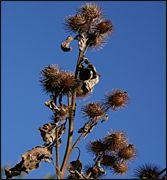One of the longest nerves in the body is known as the vagus nerve (VN). The VN is the 10th pair of cranial nerves that originates at the brain stem in the medulla oblongata. This nerve is part of the parasympathetic nervous system, which is a part of the ANS. Research suggests ear acupuncture can activate the VN.
Herbs & Botanicals
Burdock (niu bang zi)
What is burdock?
Burdock is a member of the thistle family. It was originally grown in Europe and Asia, but is now widespread throughout the United States. It is a short, dull green plant that grows in light, well-drained soil, with wavy, heart-shaped leaves and roots that are brownish-green or black on the outside.
Both the root and leaves are used in herbal remedies; however, the roots are the most important part in terms of herbal medicine.
Why do we need burdock? What is it used for?
 Burdock contains high amounts of inulin and mucilage, which may ease certain gastroistentinal
conditions. It also contains many bitter-tasting compounds thought to aid in digestion,
and substances called polyacetylenes that have antimicrobial properties. In addition,
burdock root may have the ability to lower blood sugar.
Burdock contains high amounts of inulin and mucilage, which may ease certain gastroistentinal
conditions. It also contains many bitter-tasting compounds thought to aid in digestion,
and substances called polyacetylenes that have antimicrobial properties. In addition,
burdock root may have the ability to lower blood sugar.
Ancient texts classified burdock as an "alterative" or blood purifier. In Japan and elsewhere, it is eaten as a vegetable. In traditional Chinese medicine, burdock root is often used in combination with other herbs to treat sore throats, tonsillitis, colds, and even measles. Today, it is used to treat a variety of skin problems, including psoriasis, eczema, contact dermatitis and gout. Preliminary studies have shown it can reduce inflammation and liver damage, although these studies have duplicated in humans. There is also preliminary evidence that a burdock-based tea can treat cancer.
How much burdock should I take?
Many herbalists recommend 2-4 ml of burdock tincture per day. Another common recommendation is 1-2 grams of burdock capsules three times per day.
What forms of burdock are available?
Dried burdock root is available in capsule or powder form. Many stores also sell burdock tinctures and extracts; in addition, dried burdock root can be used in tea.
What can happen if I take too much burdock? Are there any interactions I should be aware of? What precautions should I take?
While there are no known risks associated with burdock, the toxicology of the plant is not well-known. Skin contact with burdock may lead to skin irritation in sensitive patients. Pregnant and lactating women should not take burdock.
Burdock may interfere with certain medications used to treat diabetes and hypoglycemia. Make sure to consult with a qualified health care provider before taking burdock or any other herbal remedy.
References
- Bradley P (ed.) British Herbal Compendium. Dorset, England: British Herbal Medicine Association, 1992; 1992💯46-49.
- Lin CC, et al. Anti-inflammatory and radical scavenge effects of arctium lappa. Am J Chin Med 1996;24:127-137.
- Morita K, Kada T, Namiki M. A desmutagenic factor isolated from burdock (arctium lappa linne). Mutation Res 1984;129:25-31.
- Swanston-Flatt SK, Day C, Flatt PR, Gould BJ, Bailey CJ. Glycaemic effects of traditional European plant treatments for diabetes. Studies in normal and streptozotocin diabetic mice. Diabetes Res 1989;413:69-73.
- Wichtl M. Herbal Drugs and Phytopharmaceuticals. Boca Raton, FL: CRC Press, 1994, pp. 9-101.


